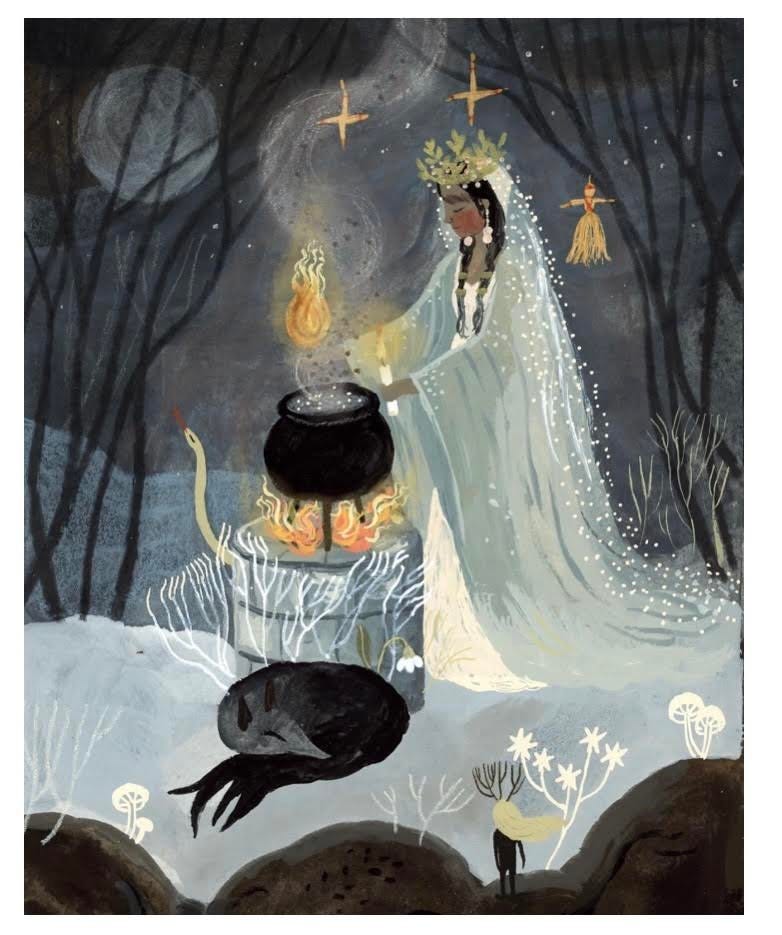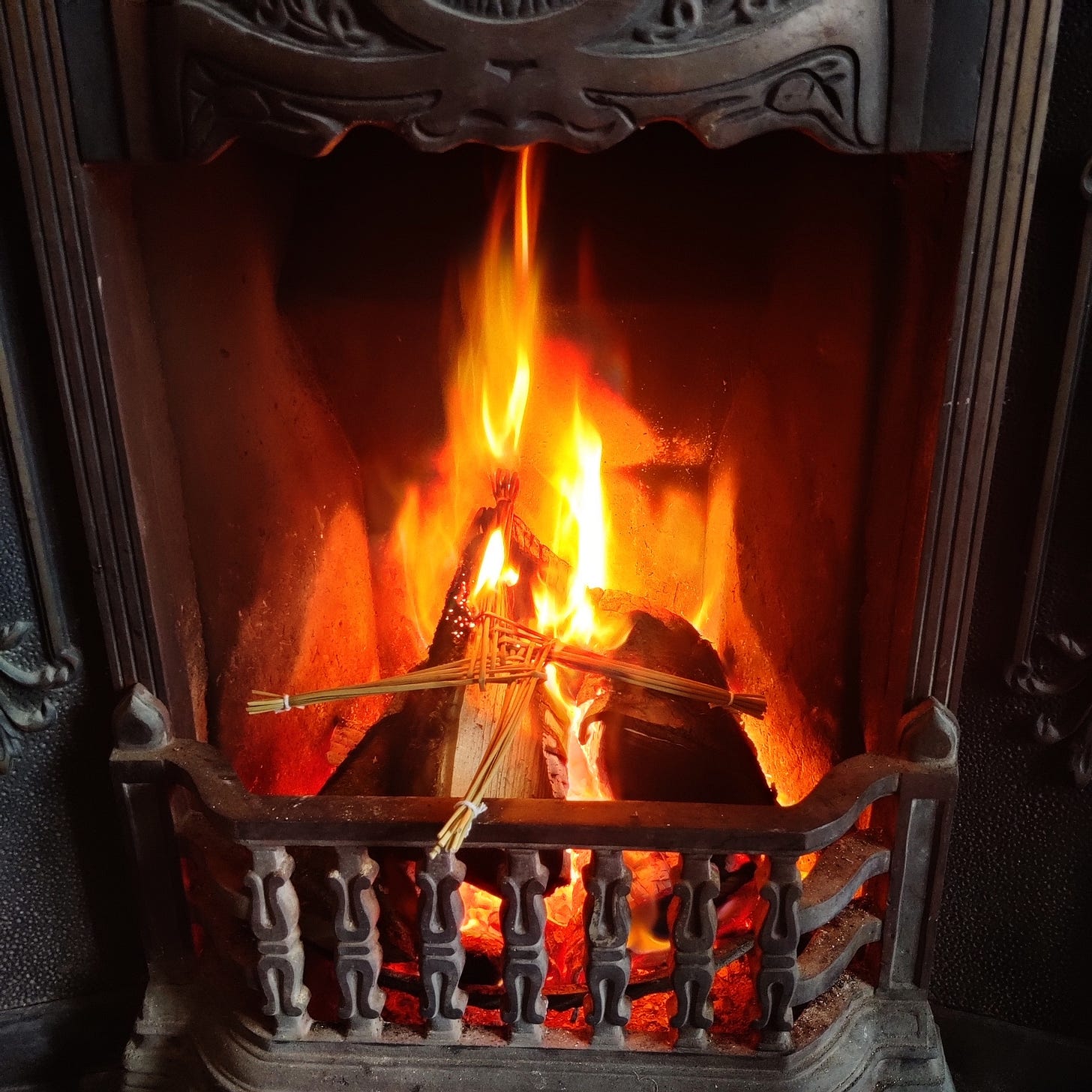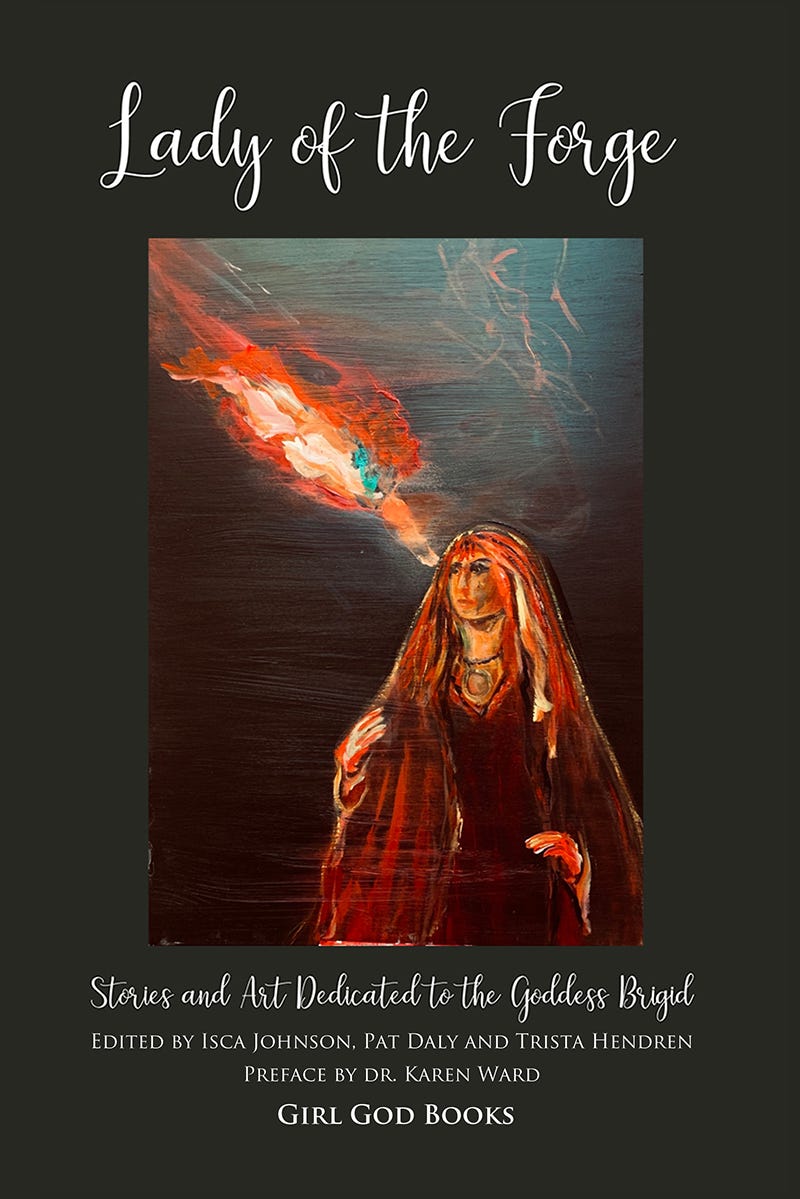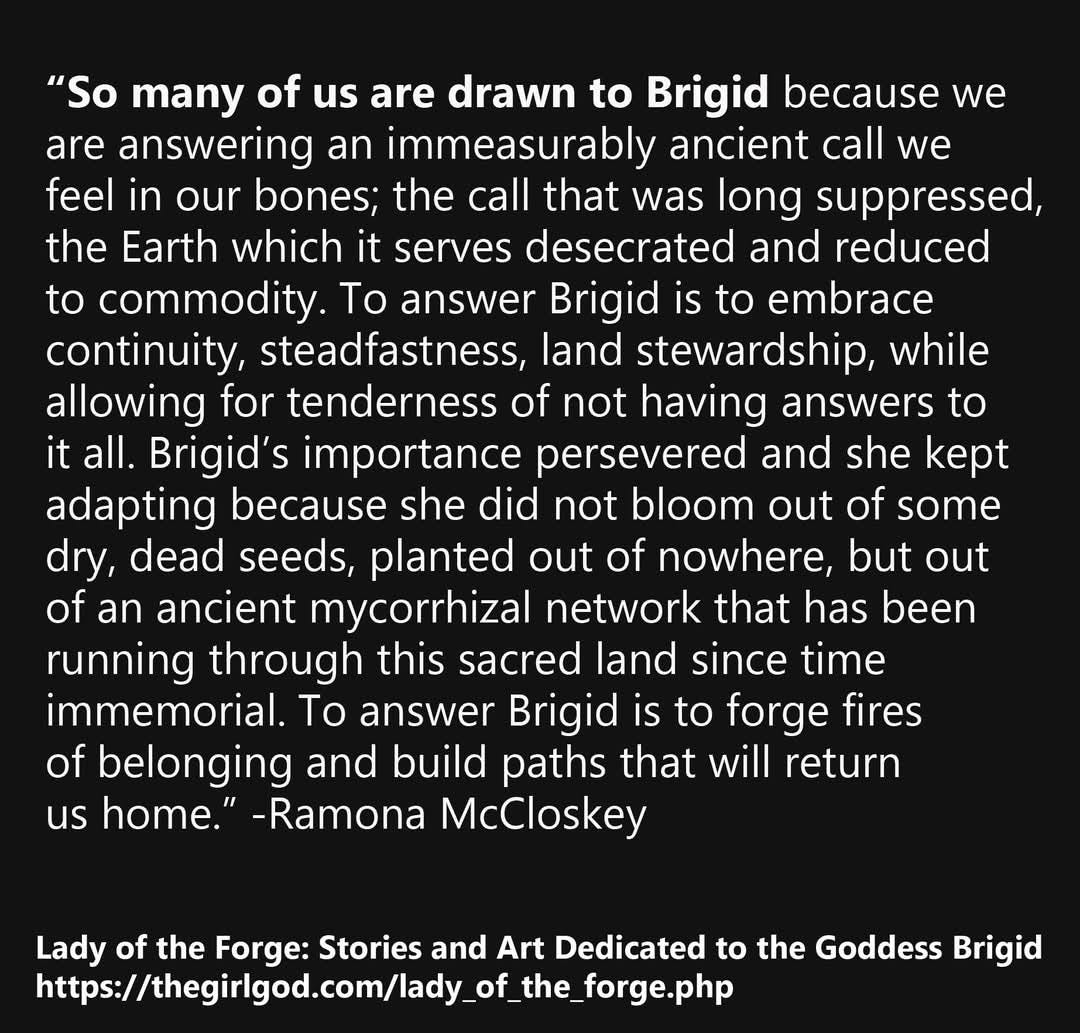Imbolc: Awakening the Fires of the Forge
Beckoning Light and Life + amplifying voices of women whose writing keeps the flame burning this Brigid's day.
A week ago, Ireland was hit by a violent storm, named Éowyn, a howling monstrosity comparable to a hurricane; the biggest storm in living memory. The biggest storm in living memory – how ominous do these words sound? Storms like this now form over the Atlantic and head towards our island with an increased frequency and rage. We're sitting ducks in the face of climate change, with mankind's industrial activity altering and shattering patterns of Earth's natural cooling and warming periods. Sometimes it feels that the very word natural is slowly fading into obscurity, destined to become one of those “obsolete” words chucked out of the dictionaries and replaced with yet another tech-related term.
Friday morning, before Éowyn arrived, we had one of the calmest days in weeks, the proverbial calm before the storm. In this perfect silence with no wind rolling down the hills, it's easy to forget the calm is an illusion. It's nothing like the calm of deep subzero temperatures, when hoarfrost cloaks the land and freezes long stalks of the moss dancing in the wind in place, and the soil and hedges glisten in faded winter sun as far as you can see. The silence of such frozen calm is one of temporary stillness, of fallowing that heralds rebirth, and you feel it in your bones despite the cold. The calm before the storm is different; it feels unsettling, it stings like a harrowing prophecy. Much like the absence of plastic waste discarded in our own yard doesn’t imply the absence of plastic in our oceans and on our coasts, and the absence of blown-up human bodies piled at our own doorstep doesn't mean colonial warfare isn't happening all over the planet, the calm before the storm is an illusionary moment of serenity, a small break the winds need to take before they gather their forces and hit us roaring and swallowing the lives of trees and humans alike. If you're ever in doubt about the nature of this calm, listen to the animals, to their silence as they retreat into shelter as soon as their nostrils first breathe in those distant fumes of incoming destruction. A sterile calm with not a note of birdsong heard is always a stark, dark warning.

There's a cross made of woven rushes burning in my fireplace this evening, a Brigid's cross for this day that marks the transition from the liminality of January and the Darkness of winter. Imbolc, the cross-quarter day that sits in between Winter Solstice and Spring Equinox, is traditionally oversimplified into St. Brigid’s day on the 1st of February. In reality, it's an astronomical, movable event that this year falls on the 3rd of February. When you weave fresh rushes on the 1st of February, depending on where you are on the island, you will either dispose of the old cross or keep it. In the past, people often hung Brigid's crosses in the rafters of their cottages year after year, and it wasn't unusual to see dozens of crosses stacked together under the roof, like silent safekeepers of communal life and folk memory. If you're letting go of an old Brigid's cross, you can either throw it in a moving water such as stream or burn it, depending on your local tradition. Local traditions might also influence the very look of your cross – they're not always a four-wheeled cross and can take a three-wheeled and many other shapes. Burning it has always spoken to me the most given Brigid's association with fire and forging. This is the time of the year when the forges of humankind and more-than-human kin reawaken. Today's day as a threshold isn't a forced one that defies the tune of Nature, like New Year's Day when we set to pursue change and new growth in the middle of darkness and try to defy the rest we sorely need; Imbolc is a time when our walk towards the Light naturally turns into a gallop. Snowdrops and crocuses push their new leaves upwards through the darkness of the soil in pursuit of Light. If you're ever setting new resolutions that your body and mind can stick to, follow the Sun and do it at Imbolc and Spring Equinox. As I burn the old Brigid's cross in the fireplace today, I'm letting go of my old skin and layers upon layers of soot accumulated on it, layers that have weighed my being down. That which is old crackles in the flames and warms that which is new when it's pushing upwards, towards the Sun.
A few days ago, amidst darkness and cold and days without electric power following Éowyn, I was struck by these tender words from
:2025 is only beginning to arrive. We don’t have a choice but to allow it. I’ve been thinking a lot more about these opposites, too. Love / hate, peace / war. Earth / air, physical intangible. And how what we really need is a bit of softness, a rebalancing of sorts. And maybe that’s where the Sukha comes in. It’s not transient but unchanging. In the ancient Indian language of Sanskrit, sukha means gentle joy, sweetness, bliss. It finds its opposite in dukha — meaning dis-ease, pain, seeking pleasure over long term blessings. Could life be more sukha? Where can we find sweetness?
In Irish, the Sanskrit word sukha could be interpreted through caomh — a sweet gentleness that can be found in people. I think these words are found in all people but because of the ways of the mind, one often clouds the other out. There is sukha - content, sweetness, when we experience delight — morning coffee, a positive affirmation, a good night's sleep. What if we could use our words as medicine, more, and spread them into our bodies and the world then too? Could we slow down enough to see again, even through grief and fear? We might not change the state of things in a day but there is a ripple effect to all things, and words are no exception. In fact, the language we use determines the way we live, the way we love. The world seeks these opposites in order to retain balance. The raw elements of fire, water, earth and air adore one another, they simply cannot exist without the other. The sun seeks the rain, the rain is looking for the earth below it, the earth is waiting for the rain, the fire is waiting for the air and the air finds weight in water. We are at a turning point, right now on earth. January is thick with opposites. The rainy season hits the soil in the countries of South, the summer burns at the bottom of the earth, whilst Europe and North America remains in mid-winter. In this stark, uninhabitable space — we dream.
Indeed, we dream. We dream to return to some mythical dreamtime that will breathe life into us, anew, collectively. As I'm forming these words, I'm dreaming by an open fire, the one that was our lifeline when Éowyn hit. We were relatively unscathed and there was no damage other than a broken garden fence, but elsewhere, the picture was different. Lives were lost, both human and animal. Our power was reconnected after three days, but as I write this seven days later, many across the island still sit in freezing homes with no heating and no way to store and cook food. Houses all over Ireland lost roofs, sometimes even entire gables, and many trees have fallen onto family homes. I already hear many calls that voice the solution - we have to cut down the trees and remove them from homes! How convenient! We are lucky to have an open fireplace and aren't completely dependent on heating systems that rely on electricity. Many aren't, as many new homes are now built without fireplaces. A number of voices nowadays seek to ban wood burners and open fireplaces, leaving people stranded in a dangerous situation in the case of natural disasters. The Scottish government even sought a ban on installing wood burners and fireplaces in all newbuild homes and conversions, but just recently decided not to introduce this ruling. While the effects that hazardous particles in smoke have on air quality are very real and concerning, it's hard not to feel like wood burning in individual homes is being used as a focal point that takes attention away from the reality and scale of pollution caused by human industry.

A hearth has been the most essential life-giver for our species for hundreds of thousands of years and its significance for human evolution can't be overstated – yet nowadays we find ourselves in a situation where the State and its agents know better than our ancestral instincts. You should depend on the power we and the companies we stand behind graciously give you for the right price. We make your life easier. Take our technology and shut up. Abandon your primitive ways and hang your heads in shame, polluters! So says the State, deflecting the harm it causes and transferring the blame for environmental pollution onto individuals while handing out free reigns to enormous, powerful corporations that light fires upon rainforests and oil fields, extract every last atom from the belly of the Earth, and overpower Earth's sacred waters with toxic chemicals created while producing more commodities we don't truly need. We don't need most of the things and services that are now a part of our everyday life in which we put convenience before the planet; we don't need the State to tell us how to live, eat, warm ourselves. Capitalism however needs this endless production and offering of bullshit items and services, same as it needs the deflection techniques of the State and the silence of browbeaten consumers. The ways in which we're removed from tuning in with the Land into artificial life managed by hierarchical powers and away from interdependence with our community and environment, are cunning and endless, and they're gnawing at the roots of what it means to be human and alive. At Imbolc, I dream of a Light bright enough to open eyes and hearts to listen to the ancestors before the governments.
wrote at Imbolc 2024:Our ancestors would have been awakening now in more ways than one , having leaned into the wisdom of hearth and soil and omen these last weeks; they would have been moving into the next part of the cycle refreshed, inspired, ready for all that is ahead.
We make the journey toward Imbolc a little differently from those who came before, but I can think of no time more than now in which we could do with some guidance.
One of those who had no power for days after Éowyn was
, and it prompted her to write this beautiful piece:It’s easy to be drawn to the darkness when you have no electricity and you live in the countryside. I’m drawn more than ever these days, befriending the dark evenings and early dark mornings leading the way towards the liminal space of Imbolc and the reign of Brigid. I find myself in the realm of a low darkness that lingers just beyond the horizon, its presence gently prompting me to move in a trance-like manner, as if beckoned by unseen forces of nature, Brigid and Imbolc.
Claire talks of this liminal time that invokes trance-like state in which we surrender to the unknown, and that's exactly how I’ve grown to feel about Brigid. I wrote about this aspect and how it relates to Brigid and the Cailleach, the Divine Hag, this time last year when I was relatively new to Substack, and that essay had a bit of a viral run and steered much of my direction as a writer. The flames were awakened – such is the power of Brigid. If you started reading my writing after February 2024, I invite you to read last year's essay below.
In the belly of cultural and social changes: Brigid the goddess and Brigid the saint
Today is Imbolg, the astronomical midpoint between winter solstice and spring equinox. Despite the fact Imbolg never happens on the 1st of February (but later during the first week of February), many contemporary pagans are celebrating it on the 1st, the date which has been established as a fixed feast day of St. Brigid. Every year, social media is full…
As an animist, I don’t use the names of ancient deities easily; I dissect them and look for remaining traces of that which predates all the boxes we neatly, scientifically labeled with names that morph between linguistics, culture and ethnicity, names such as Celtic, Norse, Assyrian, Turkic; Indo-European, Uralic, Semitic… Those traces are here. Often denied, yet here. No dry scientific categorisation, no reality of colonialism, no changes in the fabric of language and culture can remove them from our mythological consciousness. They've been written in our DNA since time immemorial, long before our distant ancestors even used language or even uttered the first speech. These traces are echoes of the most primordial impulse and understanding a living being can have — the sense that it and everything around it simply is. Everything simply lives. This sense comes from soaking in the moss under feet and paws, from hearing the thunder after lightning illuminates the night sky. What we call ourselves can change, the languages we speak can change, what we call our spirituality can change, but the sum of our past and our tactile perception of our environment keep living on in traces. This is what I see in Brigid; as an animist, as an archaeologist, as a woman. It's far too easy to say Brigid is a Celtic goddess, a Christian woman, a blend of a pagan goddess and a Christian saint – and all these combinations erase thousands of years of (pre)history. What I see is layered evidence pointing to a much more complex origin: Brigid is a multitude of echoes from Earth's deep past that blended together on the island of Ireland.
A few months ago, I came across a call for submissions from a small, independent publisher I’ve respected for years. Girl God Books was founded by Trista Hendren in 2011 (and I first came upon the Girl God that same year) and is a vocal signatory of Publishers for Palestine. The call for submissions was for an anthology on, of all things, the goddess Brigid! So I pulled out last year's essay and let myself ruminate further to tie Brigid to thousands of years of Land-stewarding spiritual practices. The result is an essay I titled “Brigid: Forging the Fires of Belonging.”
I'm happy to say I'm now able to say thank you to my readers by gifting you six copies of this anthology, Lady of the Forge: Stories and Art Dedicated to the Goddess Brigid, that has been officially released today. With a paid yearly subscription (40 GBP) you can get a copy (19.99 USD / approx. 16 GBP on Girl God's website) for free anywhere in the world. If you upgrade to founding member (65 GBP), on top of the book you will receive one of my original archaeology-themed watercolour paintings or handmade linoprints. If you have any questions about subscribing, you're welcome to send me a message or email anytime.
Ailbhe's and Claire’s words I quoted above felt like an instinctive continuation of what
wrote just as the winds of Éowyn started creeping in into our corner of the island, “the light will return... in its own time.”In my depths I can sense that these are winds of change, that they will rattle us, blow away the debris, shake us to our core in order that we might see with more clarity. I cannot help but feel that the days after the storm will feel different, clearer somehow as we make our way towards Imbolc and the returning of the light… In its own time.
And so it feels after Éowyn. There are arguably more voices talking about how unprepared we are for disasters like these, how dependent we are on technology, how our survival skills and instincts regressed. We are rattled and we dream as we clear the debris, in ways that speak louder than those who keep burying their heads in sand in comfort and denial.
writes:There is a quickening, something stirring in the space scoured clean by winter’s storms, literal and metaphorical. The selkie is whispering, and I am listening.
There is no option but to listen, not if we want to survive and thrive on a livable planet.
What will we dream into existence in a time of polycrisis? What will we dream in when we uproot that which harms us, like commercial plantations of shallow-rooted, non-native spruce that yielded in the face of Éowyn? What buried, unhealed Darkness can Imbolc help us release as a framework for tapping into greater awareness, transformation, sacredness?
When we industrialised our lives, moved away from working with the land and moved faster towards the digitalisation of our world, consumerism and ultimately neo-capitalism, we unwittingly made a pact with the land. We used the earth’s resources, yet we didn’t listen to what the payment for those resources might be.
We have arguably spent around 6000 years, since we first started farming, attempting to control what cannot be controlled, separating ourselves from it and gradually becoming further and further apart from it rather than a part of it. Making pacts and taking gifts we can never hope to truly repay within our own lifetimes.
So it’s time to make a new pact.
We are not in control, we never were and we never will be, this is a relationship of trust, abuse that trust and the land will call in its dues: wildfires, tsunamis, storms, extremes of weather, the land is reclaiming its resources. If we listen, the land will also tell us what we need to do to restore the balance, to accept the pact we made all those years ago and make a new one. One that seeks to mend the damage done in a deal we did not fully understand and instead make reparations.
If we listen to the stories in the landscape and we can hear what the land needs and how we might start to build a reciprocal agreement with the land once more. This space, the place in which we listen to these stories, is on occasion liminal. It glimmers, shimmers, becomes dark and moves, just out of sight in the peripheral.
Stories are a way of making the liminal tangible without controlling it. They allow us to see and make sense of that which is sometimes illusive, abstract and invisible. Stories reignite a spark of recognition that lies within all living things, reminding us that we are part of the land’s stories. -
, “A Pact With the Land”









Thank you for including my words Ramona. It is heartwarming to know there are others who feel the same. If we all resonate the same message surely the earth, the land and the communities around us will hear and join with us.
You've covered a lot of ground and I enjoyed learning about the traditions. And yes, if only words could weave that calmness 2025 so badly needs, turning away from the capitalism that destroys only to profit from artificially created needs...